Friday, 31 May 2024
12:04 PM
The surest way to cast a critical eye on the amount of stuff that you have is to prepare for moving. The prospect of boxing up all that stuff and hauling it and finding a place to put it at the new domicile can lead a person to wonder why they even need all that. This is particularly true when you're downsizing from, say, a four-bedroom house with a double garage to, say, a two-bedroom condo with a single outdoor parking space.
We did this some years ago, which resulted in a huge yard sale and a sometimes-painful culling of all our stuff, especially books. But we did it, and in our little place we're a wee bit tight, but we manage.[1]
Chapter 2. Over this last winter, we spent about six months in San Francisco for my wife's work. During that time we lived in rentals. When we drove down, we took what we needed in one large suitcase and two small ones.[2] We bore in mind the sensible travel advice that you don't have to bring everything with you — your destination has drugstores and clothing stores (and for me, hardware stores, ha).[3] So while we were in SF, we made trips to Target and Daiso and other locales where we could fill in any missing stuff.
 This worked well. Our rentals had laundry facilities, of course, so I was able to cycle through my limited wardrobe. And we were indeed able to get the additional things we needed — my wife needed some work clothes, for example. This worked well. Our rentals had laundry facilities, of course, so I was able to cycle through my limited wardrobe. And we were indeed able to get the additional things we needed — my wife needed some work clothes, for example.
But we bore in mind that these acquisitions were either temporary (to be left behind at the rentals or donated) or we'd have to haul them back with us. This mentality helped frame the question of whether to buy stuff: for everything that we acquired, what were we going to do with it when our stay in SF ended?
(One place where this kind of failed was with books — between visiting a gajillion bookstores and going to weekly library book sales, we acquired more books than we probably should have. I ended up shipping books back home via the mail before we left.)
Chapter 3. Back in Seattle! After unpacking the suitcases, I went to put away the wardrobe that had served me well during our extended leave. But when I opened my dresser drawers, I was kind of shocked: I have so much stuff. I had been living with a collection of, like, 9 or 10 shirts. But at home I have two full drawers full of neatly folded t-shirts. Why? Why would I need a month's worth of t-shirts? I had the same experience in my closet — why do I need all these shirts/pants/sweatshirts/coats?
Well, I don't.
So another culling has begun. These days, when I pull out a shirt, I might look at it, and say yeah, no, you go in the Goodwill pile. This process is not as concentrated as if we were moving again, but it's steady and I'm determined to keep at it until I'm down to a collection of clothing that I actually use. Ditto kitchen stuff, linens, office supplies, leftover project hardware, and all the other stuff that just accumulates. (Books, mmm, that one's hard.)
Taking a break from our stuff, and living adequately with less of it, has really helped us look at it again with a bit of a critical eye. I suppose "Do I really need this?" isn't exactly a question about "sparking joy", but I hope it will be just as effective.
__________
[categories]
personal, general, travel
|
link
|
Friday, 17 November 2023
11:49 AM
We’re staying in San Francisco for a few months, so we’re in a rental. It’s nice enough, but there are little things here and there that feel like they could be improved. (For example, no rental I’ve ever been in has had enough lighting.) One such thing in this rental is the kitchen faucet:
 I hand-wash dishes, so I like to have a sprayer attachment for the kitchen faucet. I reckoned that hey, they’re not expensive, I’ll just get one and attach it myself. I hand-wash dishes, so I like to have a sprayer attachment for the kitchen faucet. I reckoned that hey, they’re not expensive, I’ll just get one and attach it myself.
Well, not quite. I took the aerator off the existing faucet and went to a plumbing supply place, where I explained my quest to the woman. She got out one of those gauges that they use to determine size and thread count, but to her surprise, mine didn’t fit any of them.
Hmm. We went to find another guy who tried the same thing. At that point I mentioned that it’s possible that this faucet is from IKEA. Ah. “My condolences,” he said, adding that he couldn’t help me with metric sizes and threading.[1]
Being an old guy, I remembered that when I was a kid, we used to have a little shower-head-looking attachment for our kitchen sink. It just slipped over the end of the faucet. Did he have any of those? He did know what I was talking about but told me that those were long gone.
Well, not quite. I went online, and dang, there was the very thing I’d remembered:
Not only was the device still available, the web even told me that it was in stock at a hardware store within walking distance.[2] Price: $4.99.
And so I went to Cole Hardware off Market Street. The outside looked unpromising, but they’d somehow crammed a complete, old-school hardware store into a space that’s the size of a bodega—two floors’ worth.
I wandered up and down the tightly-packed aisles till I found the plumbing stuff. I had to get down on the floor and root around in the back, but sure enough, there it was: the Slip-On Wide Sprayrator (“For mobile home kitchen sinks,” wut). To my professional amusement, the instructions for installing it are wrong—they show you how to screw it on, whereas the entire point is that you don’t:
Whatever. I had to enlarge the hole a little bit, but it did in fact slip on, and I now can enjoy the benefits of a sprayer while I wash the dishes:
I enjoyed the entire experience so much—success in finding a nearly ancient piece of plumbing technology, plus my visit to Cole Hardware—that I got myself a hat that features a skyline made of tools:
At this point, it would probably be wise of me not to study our rental apartment too closely. As much as I’m now feeling empowered, I should probably rein in any further urges to improve the place.
[categories]
personal, house, travel
|
link
|
Monday, 18 June 2007
05:49 PM
Happy belated Father's Day to me.
Flight patterns. Beautful. "Data from the U.S. Federal Aviation Adminisrtation is used to create animations of flight traffic patterns and density." (Quicktime version) [via Kent Sharkey]
Bad Names. Smells like bad design spirit. Eric Lippert cleans up a lot of "crufty old code" in the .NET C# compiler and comes up with a list of function names that "smell bad" and "which could use some serious thought." Do you have any functions with these names?
The existential angst of Ichiro. A collection of quotations from Ichiro [Suzuki] of the Seattle Mariners. Sample: On how to break out of a slump: "If I'm in a slump, I ask myself for advice." [via Seattlest]
How to Clean Up a Windows Spyware Infestation. Jeff Atwood shows you (in pictures!) tools and techniques for removing spyware, including the nasty kind that keeps coming back.
Congressional hearing: tense and moody. Colleague David links to Jon Carroll, essayist for the San Francisco Chronicle, who today is delighted that the term hortatory subjunctive showed up in Congressional testimony. Synchronicity: this term has shown up twice today -- the current AWADmail sent out by Anu Garg sends contains a note from reader Victor Lund who says about the word dehort: "Dehort brings back memories of classes in classical Greek. After a few months, one learns that sentences such as Let's go! in Greek are formed with a grammatical construction known as the hortatory subjunctive, meaning, of or pertaining to exhortation." Dang, it's Greek grammar day around here!
[categories]
roundup, technology, travel, language
|
link
|
Tuesday, 18 April 2006
10:08 PM
Sunday found us feeling a bit queasy, due both to the previous night's quaffery and the distinct lack of coffee or suitable substitute caffeine beverage. We opted out of breakfast next door and set off with Li Xian Dong to visit his village. Twisty roads on an empty stomach, oy.
But soon enough we arrived. Li Xian Dong is part of a partnership that's developing the area surrounding his village and several more. They rent (can't buy) the land from the local cooperatives and are putting up facilities for tourists. They have a modest hotel already, plus a restaurant, and are working on creating an upscale resort in the area. This is all good news for the local inhabitants. Although the development takes land away from agriculture -- a charged issue in China -- the income for the locals is so much better from tourism than from farming that they're quite happy to lease their land.
Here's the hotel, carved out of the mountain.
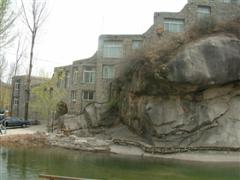
Bob said that the business climate in China right now is like the Internet boom -- the place is bursting with ideas and plans and deals. There are some issues, primarily governmental, in how business can be transacted, but ambitious and hard-working people (which would include Li Xian Dong) stand to do very well for themselves in the coming years. To paraphrase Coolidge, at the moment (and perhaps always) the business of China is business.
We had lunch at the Li Xian Dong's restaurant, where if we had wanted to, we could have fished part of the lunch out of the little pools out front:
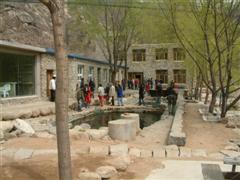
An unusual feature of that meal was that one of the greens consisted of delicate little buds from willow trees. Try finding that at your local Panda Express. In fact, I should note that if I remember correctly, we virtually never saw a dish that we would ever order at home. Many, many interesting things to eat, pretty much all of them brand-new to us.
Li Xian Dong gave us a ride back down to where the highway ends so we could find a ride back into Beijing. Bob found a taxi with a female driver, the first we'd seen, and he negotiated a price. A second negotiation then took place in which the girl asked her family for permission to drive into Beijing. The ride into town illustrated why they might have been wiser to say no. She had never been in Beijing, and our ride included some heavy braking and a couple of last-second turns. We kinda wondered if she'd find her way home again. (Incidentally, we calculated that gas costs just about the same as it does here in Seattle.)
That evening Bob took us out to eat with a neighbor friend of his, a woman who'd run a soy sauce factory and then helped found and run a chain of bookstores. This time we had cuisine from the Yunnan province, which featured a lot of red peppers and more shrub-derived greens. This was our last hurrah for Chinese food, since we were up and out early the next day.
Monday we got on a plane at 9:05am in Beijing and arrived Monday morning at 8:30am in Seattle. I realize this is all logical and stuff, but c'mon, that's just weird, heh.
All in all, it was a great trip. We actually saw more than I thought we would, and being able to see Beijing through the eyes of, effectively, a native was truly invaluable. In many ways Beijing reminded me of Mexico City, which also has insane traffic and bargaining and well-attended tourist activities and friendly natives. But China is different, a country that's both emerged from some tough times in the last decades and one that's obviously a huge, vital force. I would love to go back again.
[categories]
personal, travel
|
link
|
Tuesday, 18 April 2006
09:42 PM
You don't go to Beijing and skip the Great Wall. I had some small apprehension about this, as in, just how Disney-fied would this turn out to be? The guidebook warned about hordes of tourists and uber-aggressive vendors and Starbucks and KFC. Sounded like something that would be endured rather than enjoyed.
But Bob came through for us. He has a friend who is doing development work in a village close to the wall, and who has a set of cabins there. Would we like to go up Saturday and stay overnight? We would.
Arrangements were made. A car appeared on Saturday morning and we headed north. It's an excursion and we spent better than two hours on the road. The drive itself was worthwhile for being able to move out of the city center, through the growing suburbs and into the countryside. The outskirts are sprouting tall tower blocks of apartments and Bob noted that the government is planning several more ring roads that circle Beijing in ever-larger concentric circles. Some of this is in anticipation of the world's attention for the 2008 Olympics, but most of it is just growth.
As I've said, this is dry country. There had been a dust storm the night before, and we noticed that cars were covered in a thick layer of reddish dust. Man, that must get old. As we moved out into the countryside, we began to see agricultural fields -- human-sized, not machine-sized -- and they, too, looked brown and dry.
The roads were good, even when we got to the end of the highway (soon to be lengthened) and got onto ordinary roads. Before we left, I had heard someone say that an impediment to economic development as yet in China was the comparatively undeveloped infrastructure, as in roads, but this close to Beijing, things are in good shape.
After turning off the highway, we wended our way through increasingly vertical countryside. It's been noted before that the peculiar-looking perspective of Chinese mountain paintings is not a visual convention; the mountains do indeed seem to spring vertically out of the ground. The trek to the our base-camp village therefore involved many switchbacks and some dramatic drop-offs at the side of the road. It also involved more and more rural traffic in the form of pedestrians, horses, and the occasional donkey cart. This provided yet another clue to why the crazy traffic is not more lethal than it is, namely, that this is a society in which cars are a very recent addition to the existing human and animal traffic, and as such, car drivers are much more acclimated to having to accommodate non-car traffic. Hence they're more careful. Although we did witness one or two heart-stopping moments in which I thought for sure a pedestrian was going to end up squashed on the front of the car.
Not surprisingly, the habitations we saw were very rustic, but I was struck my how orderly everything was. I've seen poor countries were everything just looked exhausted or clapped-out, but here, things were in good repair. I noticed that the fields were terraced neatly, which is a combination, I guess, of millenia of working the land and more recent efforts by the government at soil conservation and improved agricultural practices. Later in the day I had a chance to stop and sift some of the soil through my hands and it was like lifting handfuls of dust. It's remarkable what they can do with such poor land, I must say.
We arrived at the village and had a gander at our accommodations, which consisted of some beach-type cabins -- nothing fancy, but quite nice. This was not a tourist place; it belonged to our host, Bob's friend Li Xian Dong, who was lending it to us.
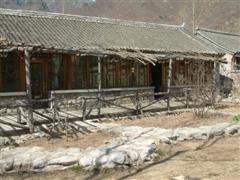
We went next door for lunch, which was cooked up and served in what looked like a family home. As usual, it was impressively excessive and (needless to say) quite fabulous. (And as we discovered the next day, far too inexpensive for what we got.)
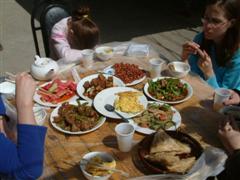
From the village we could see the Wall, snaking high above us along the ridge of the spiky mountains. After lunch we began our climb. We walked past the village and then followed a well-worn path that had us stopping every once in a while to catch our breath. (We were told later that we'd climbed the "barbarian" side of the Wall. The roughness of the country made me slightly surprised that the Wall was even needed, but those steppes ponies could make it up some high mountains, Bob said, perhaps half-jokingly.)
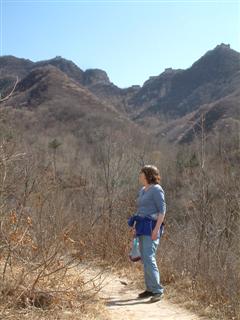
We finally arrived at the Wall, panting. I was gratified to see that unlike so many other famous attractions, the Wall looked very much like I'd pictured it. And I was very, very happy that we'd come to this place rather than the neon-covered parts of the Wall that cater more to foreign tourists.[1]
I was also interested in how unimproved the Wall was at the point we saw it. It's been falling apart pretty much from the time it was built, I guess, and at times was actively deconstructed -- Li Xian Dong told us that when he was a kid, they hauled stones down from the Wall to build their schoolhouse. (Part of PE class, he said, if I understood right.) In parts the Wall is quite overgrown, and climbing into and out of the guardhouses involves clambering up some rickety piles of bricks that would have had any insurance company in fits, although it did not slow down the multi-generational Chinese families from scrambling around on the Wall.
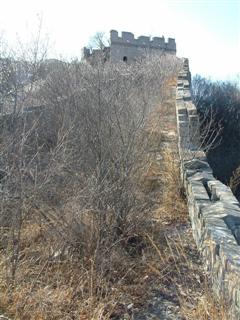
We hiked around a bit, and then Bob, Li Xian Dong, and I tackled a part of the wall made a little loop up a hillside, and that's known as the "Bull Horn" for the shape it makes. This part was particularly steep. Li Xian Dong, who's been climbing the wall since he was a boy, was as surefooted as a mountain goat, but I was hanging on with all four limbs to clamber up and then again down. You can get an idea from this photo; the slope is not a trick of perspective, that's what it actually looks like.
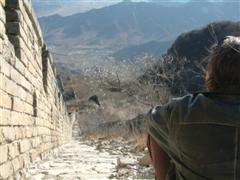
While we were up there, Li Xian Dong found a stone thing that he explained to us was a kind of proto-grenade. It was a stone with a cylinder carved in it for the powder and a little hole on the side for a fuse. (That made it seem more to me like a miniature cannon, but I'm sure he knows more about it than me.) I've read before that the Chinese invented gunpowder, but supposedly didn't use it for anything more martial than firecrackers. Ha.
Hey look, it's me:
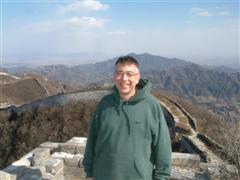
We climbed back down through some beautiful forest land. Bob observed that there are no animals, and I'd noticed that I had seen no insects. (For example, no ants, which is hard to believe.) We saw just a few birds, including magpies and crows, the latter in the plowed fields, suggesting why farmers have hated crows for so long. The weight of so much human intrusion for so long has made animals scarce, was Bob's explanation.
Back in the village, we went next door again for dinner. We had the same endless choices, but this meal also involved some of that toasting that is supposed to mark celebratory meals. Li Xian Dong brought out a bottle of the local hootch, which Bob said was distilled out of sorghum. I was advised that I had to drink at least two toasts before begging off, and that the correct procedure was down the hatch in one. I did this. All firewater tastes pretty much the same to me (blucky), but Bob and Sarah pronounced it "not as bad as expected." Soon enough the bottle (half liter?) was gone. Plus there was beer.
We slept well.
[categories]
personal, travel
|
link
|
Monday, 17 April 2006
11:09 PM
When you go visit someplace, you go have a look at their big religious architecture -- cathedrals, temples, pyramids. Short of tombs, perhaps, and maybe the Taj Mahal, people have historically put their best efforts into religious buildings, which explains why so many of them are so spectacular.
Today's goal was to visit the Lama Temple, which is the best-known Buddhist temple in Beijing. It's also where Buddhist monks -- lamas -- live, and therefore is also known as a lamasery, a word I find unaccountably delightful.
I never quite got clear on whether the Lama Temple was spared by or simply recovered from the Cultural Revolution, a period that was hard on religious architecture. In either event, it is a beautiful, well-kept compound that houses a succession of elaborate Buddha statues, including a giant, 60-foot representation that -- as is inevitably pointed out -- was carved from a single tree.
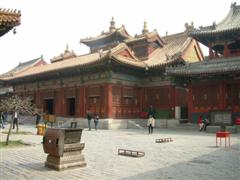
(No photos of the Buddhas allowed, but this is what the compound looks like.)
I don't know much about Buddhism, so when I read that the temple is part of the Yellow Hat sect of that religion, I think "Huh, I wonder what that means." But it occurred to me later that if I were to visit a major shrine of, say, the Methodists, I wouldn't know significantly more about that particular sect, either. So my ignorance of theology is cross-cultural, at least.
The temple is a working facility. We saw monks, or at least, guys walking around in monkish robes. And the temple still functions actively as a place of worship. People bring or buy incense, and in front of each of the five halls, there are stands with a fire going and a place to offer incense and pray. People were doing this as tourists strolled around, which was just as incongruous to me as wandering around a cathedral while people are kneeling and praying.[1]
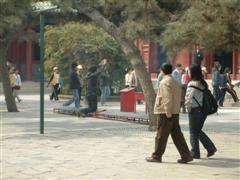
The drill seemed to be a kind of stations-of-the-cross thing where people would repeat their offering at each of the altars, that is, at each of the five halls housing a Buddha statue. It would have been interesting to hear someone explain this and to ask why people do the ritual -- is it something they do, say, every week, or when they want to pray for a specific outcome, or what?
In any event, most of the tourists took a spin on the prayer wheel:
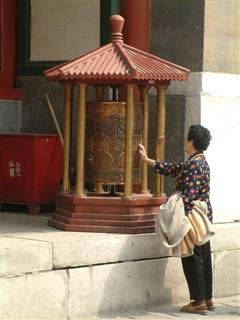
After the temple, we wandered around looking for lunch. We ended up in a hot-pot restaurant (another hole in the middle of the table, this one filled with boiling broth). I'd thought that the pictures-on-the-menu strategy would work, but not this time; although we could point to pictures of beef or vegetables, the waitress kept insistently pointing to a set of Chinese characters on the menu, and when we clearly didn't get it, she circled them with her pencil for emphasis. Once again we employed the mobile phone to get Bob to do some translating, apparently interrupting a meeting. I think in the end she was trying to tell us that the first order of business was to order the hot pot, and then you order the stuff that goes in it. Which is, may I note, another meal you cook yourself, heh.
Lunch accomplished, we wanted to make one more shopping excursion, as we figured this would be our last change in Beijing. We headed back to the Dazhalan hutong we'd been at the day before. I had secured from my daughter some measurements and I wanted to see if I could find a silk dress. Here we got a reminder about making culture-centric assumptions. I had had the foresight to convert the measurements from inches to centimeters. In the store, we somehow managed to convey to the clerk ladies that we needed to measure the dresses, and they produced a measuring tape with centimeters on one side and inch-things on the other. Using the inch-thing measures, we held the tape up to the dresses, which looked awfully narrow. When the clerk indicated that we should tell her what size we wanted, I showed her the inch measurement. She glanced at it and scoffed (in Chinese, but we got it) "Impossible!" Chastened, I reverted to centimeters and only then did I notice that the inch-things were not, in fact, inches; they're some other sort of measurement that's neither inches nor metric. We had just assumed that they were inches, oops. But we had the metric, so that worked. Mission accomplished.
The plan for Saturday was to get up early and head for the wall, so we turned down offers to go out. Instead we ate in and watched one of the many pirated movies available to us. What with the age range to accommodate, we choose King Kong. Jeez. After yet another of the endless perils-of-Pauline scenes on the island, Sarah summed it up for all of us: "One of the definitions of a B movie is that it's 90 minutes long!" But we did get some unique amusement out of our pirated copy -- at one point I turned on the English subtitles. I got the distinct impression that we were reading the output of a Babelfish translation, which leads one to wonder why they even bother. They were weirdly fascinating, but very distracting, since they had little relation to the actual dialog, so we had to turn them off. Bob assured us that the Chinese subtitles were similar, with the difference that the audience would not have the actual dialog as backup. God only knows what the Chinese think we're saying in those Hollywood movies.
Saturday, then, the Great Wall.
[categories]
personal, travel
|
link
|
Friday, 14 April 2006
04:36 PM
Various things of note.
We haven't encountered many American tourists. Germans, yes (of course), French, Englishmen, Spanish speakers, Japanese (duh), all sorts of Russians, and others whose languages I don't recognize. Not sure if Americans are here and clustered in tours, or whether they're just not here to be encountered.
There aren't many dogs, and virtually no big ones. The dogs we do see are almost always -- this makes me laugh -- Pekingese. We've seen a total of three cats. There's some history here that we can skip lightly over, but you'd think that by now the pet population might have been restocked. So perhaps there are other cultural factors at work.
I was flipping through Bob's collection of pirated DVDs and noticed something amusing. The covers often have pullquotes on them from reviews -- you know, stuff like "A must-see!" -- except that the quotes they use are, mmm, perhaps not ones you'd find on legal copies. Some examples:
Movie: Be Cool
Quote on box: "A real chore to sit through."
Movie: My Boss's Daughter
Quote on box: "... a movie so thoroughly cretinous the people who made it couldn't get even the punctuation in the title right."
Movie: The Weather Man
Quote on box: "If you liked Crocodile Dundee, you're going to love Crocodile Dundee II." (WTF?)
Theory is that these are selected by people with an imperfect understanding of English. So, "chore" and "joy", kinda the same, right? That word "cretinous," dunno, sounds like that's probably a good thing, right? Heh.
I've learned the Chinese characters for two words: entrance and exit, which I learned from the highway and which are easy. At this rate, I'll pick up the remaining 2,498 I need in, let's see, what, 25 years? Bob's been pretty patient about explaining the theory of the characters to us, and it's pretty cool. There is some method to the apparent madness. Another project for my putative retirement.
I was following a cute family unit today, parents and twin boys, maybe 15 months old. The little boys were wearing pants that were split front to back, and no underwear. Toilet training, Chinese style -- no diapers, just easy access.
Bob studied government, and has a post-grad degree in Econ, and he's lived in China for ten years or more. Wow, interesting conversations about politics. One perspective I hadn't though about is that from the POV of ex-pats, the only thing that matters is U.S. foreign policy; domestic policy does not affect them for the most part. And globalization, which affects their day-to-day lives, so they're all pretty much for it big time. Bob's take on it went something like this: so a steelworker in the U.S. used to make $15 an hour and now makes $10; a steelworker in China used to make $1, but thanks to globalization, now makes $5. Where's the problem? More, please. He notes that in the last 50 years, more people have been raised out of poverty than in all human history. Probably true, but perhaps some of the details are not as encouraging. But I guess if you're a macroeconomics dude, that's how you think.
And Mao. A truly historical figure, although undoubtedly a tyrant. Bob says that getting five Chinese to do anything together is hard enough; Mao somehow got a billion of them to work together, no mean feat. Mao is well on his way to a kind of deification that's above ideology; for commoners, he's the patron saint of the modern era. (Although I suspect that the trade in Mao t-shirts and faux historical Mao posters is strictly for the tourist trade ... those crazy Westerners will buy anything, it seems.)
[categories]
personal, travel
|
link
|
Friday, 14 April 2006
04:27 PM
Our plans for the day had to be scuttled due to a logistical difficulty. We got two guidebooks and have been alternating between them. The plan for today originally was to follow a suggestion in Guidebook 1 to go to the end of the subway line and then go a little further to some picturesque place. But Guidebook 1 seems to have stayed behind at a restaurant or in a taxi, so ... Plan B was to peruse our remaining and less favorite guidebook for ideas. They have a section on "wanders", and after reviewing their offerings, we just picked one, which consisted of a tour through one of the better known hutongs, or old-style narrow, twisty, alley-like streets.
To get there, we took a leisurely ramble through Ritan Park, which is between us and the subway. Parks here are cool. There's playground equipment of various types -- for kids in the "pleasure grounds" aka playground, and regular gymnastics equipment, where I saw some well-aged guys doing giants on the high bar. Most surprising to me was exercise equipment like elliptical trainers, weight-lifting rigs, and log-rolling things that serve the same function as treadmills. All heavy-duty metal. The funny thing is that they're all used by old folks.
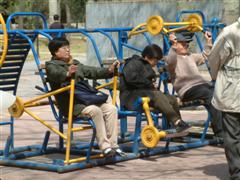
The equipment includes a backscratching thing that an old lady was using like a bear with a tree trunk:
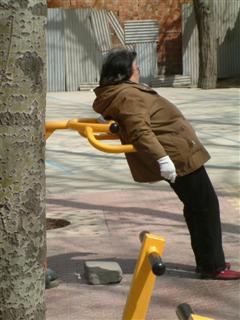
Then the subway. That worked fine, except when we were buying tickets and simply could not understand what they wanted. But a nice lady behind us, a Westerner, leaned over and said "3 yuan each," and was kind enough not to add "so can we all get moving?" But that hurdle overcome, the subway was fine -- pretty much like every other I've been on.
The first part of the hutong tour took us through a commercial district that's been there for hundreds of years. The stores sell both traditional stuff plus cheapo modern goods at prices that were as good as we've seen. At times an odd juxtaposition. But the focus is on the traditional, and we visited stores that had a huge selection of silk and cashmere wool on bolts, ready to be tailored, in addition to ready-to-wear. There are also herbalists, traditional pharmacies, whatever you call them, where they sell powders and potions for what ails you. (Which they'll also help you diagnose.)
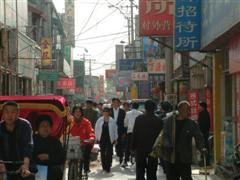
The other end of the hutong tour is a collection of stores that sell antiques (or "antiques"), calligraphic supplies, and books. The latter part was clearly much more tourist-oriented; we didn't see too many white faces in the silk stores, not that they didn't adjust prices as the opportunity arose. (Us.) The organized tours do the hutong thing by putting you in a rickshaw, which presumably deposits you in front of the "antiques" stores.
Per the guidebook, to get from one commercial part of the hutong to another, we had to wend our way through a maze-like residential area. This afforded us an inadvertently extended tour of the area. Our guidebook map lacks detail, so we missed some apparently important turns. But it was actually sort of interesting to have a gander at the residential conditions of some of the poorer Beijing residents. The guidebook says that the government is flattening a lot of these neighborhoods. Picturesque doesn't compete with the need for space, and in fact, we saw where they'd flattened a big swath through the middle already.
I noted that I keep being surprised by the quantity and convenience of the public bathrooms, and as were wandering around the residential part of the hutong, it struck me that the public bathrooms are just that -- public bathrooms. As in, the local residents don't have toilets at home. Aha. Bob confirmed this later, and noted that this was yet another reason that the government wants to bulldoze the old hutongs and put up modern buildings. You can see their point, although it will definitely be a loss in the character of Beijing.
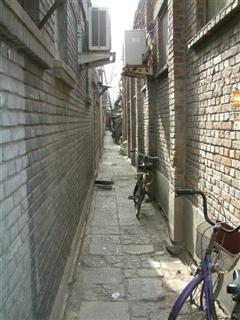
In the evening, Bob had been invited to a birthday party at a restaurant, a party for ex-pats. Very nice restaurant, the guests we met Americans or Australians. They called it "Korean barbeque." There's a hole in the middle of your table, and they come out and put a thing of red-hot charcoal into the hole, then put a grill over it. They put out sliced beef and fish-in-foil, and you cook stuff yourself, doing your best with chopsticks over a hot fire to turn the slices and so on. Think you're good with chopsticks? I got a test for ya. A lot of food we've had here seems to be more interactive. As usual, more food kept appearing, good god. And beer. So another evening of staggering home after way too much food that's too good not to eat.
[categories]
personal, travel
|
link
|
Thursday, 13 April 2006
04:40 PM
The agenda today was to visit the Summer Palace. This is about 7 miles from Beijing, set on a lake that, we read, provided some relief from the summer heat of Beijing. (I've mentioned, I believe, that Beijing is semi-arid? Like, not far from the Gobi Desert, and a question I keep asking myself is why people would site a capital here.) We took a taxi there, thereby surely making some cabbie's lucky day.
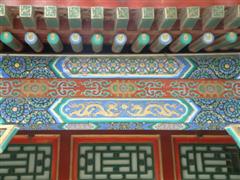
I loved the Summer Palace because, let's face it, who wouldn't want a nice lakeside place that covers 700 acres? It's a seemingly endless series of lawns and pavilions and bridges and temples artfully arranged around a lake and a series of inlets. To my surprise, the grounds are in somewhat better shape -- that is, better restored shape -- than the Forbidden City. But perhaps not surprising. It was built for the first time only in the 1700s and has suffered some razing since then at the hands of foreign troops, thus obliging the Chinese to rebuild it. Even so, some of the more popular attractions are, what else, undergoing restoration in preparation for the 2008 Olympics. One such attraction is the Long Corridor, a lengthy covered walkway that runs along the lake connecting various pavilions, which we saw but one or two courtyards of before seeing, well, a lot of scaffolding.
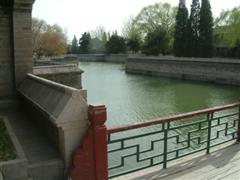
Story has it that a lot of improvements were made to the Summer Palace under the Empress Dowager Cixi, who was regent for the last emperor. Specifically, she diverted funds from the navy to her pet project, a move that pissed off her contemporaries but that the Chinese recognize today as having been a better expenditure. Deriving a lesson from this is left as an exercise for the reader.
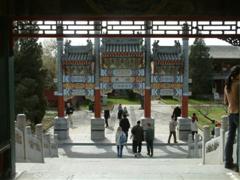
The taxi thing is working out pretty well. The guidebook has many dire warnings about taxis -- don't use unmetered taxis, don't let people guide you to specific taxis, etc., etc. But it's not problem to just flag down a taxi pretty much anywhere. It's basically like, say, New York, where taxis are the de facto transportation for people who are above (haha) the subway. (Bob said that most of the cars we see have been on the road only in the last couple of years. As with New York, having a car has a lot to do with prestige, because surely can't be convenient to own one in Beijing.) And taxis here are actually pretty cheap -- 10 yuan ($1.25 US) for the first 2 kilometers, and not so much per additional km. The most expensive taxi ride we've had has been $8 US for a 25-minute ride to the Summer Palace.
Our long ride to the Summer Palace also clued us in to one reason why there might not be so many accidents -- traffic just doesn't move fast. In congestion, of course, it hardly moves at all, but even on the highway (the ring roads, in our case), our taxi driver was barely pushing 60 km/hour (~35 mph). Another difference is that people don't seem to get so territorial --drivers cut each other off, they nudge their way in front of each other, they stop and let passengers on or off, and oh well, that's just how it is, and except for the occasional annoyed toot on the horn, no one seems to suffer a lot of road rage. Unless we just haven't seen it.
After the Summer Palace we had plans to head back into town for an evening. Our map situation is not so good; we actually had a large, detailed Beijing map (in English), but oops, that stayed in Seattle. So we're working off the little half-page maps in the guidebook, which show landmarks and major streets, but in eye-achingly tiny print. But we've managed by orienting ourselves around the landmarks (such as pointing at them in the taxi until the driver makes the internationally recognized sound of "Aha! Got it!"). Now and again, though, we feel the lack of details. This evening, for example, we wandered around a bit looking for a particular theater, which was just a little mask symbol on our guidebook map. In the end, we called Bob, who called the theater and asked their address, who then called us back with directions. So it all works out, somehow.
While wandering around, we were looking for some dinner. Something I learned last year in Japan was that if you're really stuck without a native speaker, you have to find restaurants with pictures on the menu. So we found a place that looked like Chinese fast food -- girls in uniforms at the counter, big menu behind them. Using gestures and the counter girls' unexpected knowledge of numbers in English, we were able to order. But fast food is fast food, and this was about the least interesting (to put it kindly) meal we've had in Beijing.
We met up with Bob and a couple of his friends to see a show of the Beijing Acrobatic Troupe. This seems to be mostly a thing that tourists do -- neither Bob nor his friends, both Beijing natives, had ever been to the show. Probably most people know the general theme -- tumbling, twirling plates on sticks, contortionsts who do handstands and tap themselves on the nose with their feet, a very traditional high-wire act (complete with umbrella), etc. The acts are all structured so that they start off doing something incredible -- twirling eight plates at a time, say -- then they add increasing difficulties, such as, oh, doing a back roll while twirling eight plates, all to somewhat cheesy background music.
So here's a typical act. Six girls come out in the kind of spangly costumes that moms might have sewed for a fifth-grade dance recital. The girls put a stack of metal bowls on their head. Then they each take a bowl, toss it, and catch it on their head. Neat! Repeat with variations. Then they take bowls and toss them on top of the next girl's head! Cool! Only ... they're doing the tossing with their right foot. Only ... they're on 6-foot unicycles while they're doing this. Or in another act, the girl was on a unicycle and dismounted by doing a backflip. Only ... she was on the high wire at the time. You can imagine the training sessions -- "Ok, good job on balancing a guy upside-down on your head. Now we want you to do that while standing on a unicycle! ... Excellent job on that. Now use one foot to stand on the unicycle! ... Ok, great. Now we're going to put you on the high wire!" You can imagine them getting a bit wary about mastering any particular trick.

Anyway, it's impressive, but it's also somewhat frightening, because you spend most of the show in different levels of suspense, interspersed with occasional heart attacks as bodies go flying through the air.
Although the trappings are kind of second-tier Vegas, nothing detracts from the incredible skills on display -- balance, strength, limberness, grace. It's just phenomenal what people can do. And many (most) of the acrobats are just kids -- in some case literally, perhaps no more than 8 or 9 years old, but certainly no older than maybe 17.
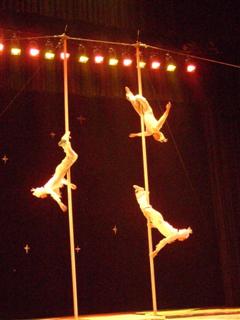
This had been a pretty full day already, but Bob conferred with his friends, and then turned around and asked "How about some duck?" Well, ok! So we transported to a restaurant where we experienced what we're beginning to understand is a common scenario -- dish after dish after dish appeared, not a single one of which we recognized. And there's the don't-ask aspect to these dinners. In this case, we had some little morsels of meat on a platter, which tasted ... interesting. I asked what they were and got a don't-ask reply from Bob. Duck hearts, I found out later. We did in fact have duck, which appeared after several meals' worth of courses had already appeared. We had the variation (perhaps the classic one) wherein the duck is served with pancakes and plum sauce. We eventually left the restaurant, all the food having stunned us into stupor.
We did inquire about this, and got the following. It's usual for one person to do all the ordering, and it would be very bad, face wise, not to have ordered enough for everyone. So there's a strong incentive to over-order, which is apparently officially discouraged, but which people do anyway. Man, I do my best to do my part, but there are limits to how much a body can eat. Especially of things like duck hearts, haha.
So that was enough for one night.
[categories]
personal, travel
|
link
|
Tuesday, 11 April 2006
08:14 AM
Today is supposed to be a down day after yesterday's full-on touring. Only two excursions are planned. The first is to the so-called Russian Market, which is a few blocks away. (The sign in English over the door called it the "Alien's Street," but the signs inside were all in Russian, like "Escalator this way," for which I surprised myself by being able to read the Cyrillic.)
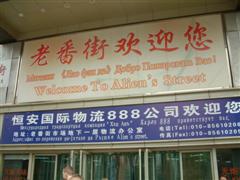
Like the market we were in the other day, it's a building full of stalls, but it's lower-key in every way. The greater number of stalls sell clothing and shoes, with one floor also containing electronics, toys, and teas. The story seems to be that the Russians come on junkets down to Beijing looking for bargains, which explained why the clothing was a bit on the garish side and why there was less effort than we'd seen on Sunday to make the knock-offs look authentic, as in, spelling brand names correctly, for example. The sales techniques were noticeably less aggressive. We were wondering whether it might not have been because the Russians are so damn hard-headed that there's not much point in trying to browbeat them into entering your booth. But we did have one satisfying incident where Bob drove a hard bargain with a vendor who accepted his price, but swore that he was driving her into poverty and she would have to return to her ancestral village. Yeah, as if.
On our way home from the Russian Market we popped into an electronics market for a quick gander at computer and stereo stuff. It was the same story, basically -- booths for several floors, each offering some selection of gear. Bob said it was legit stuff, not counterfeit; most of the stuff is manufactured here in China anyway, and we were probably looking at stuff that had somehow fallen off the back of a truck. Some of the larger booths were official distributors for companies like Dell, he said. Prices were good for domestic stuff, but the same as home for anything they probably had to import. I hadn't brought a list of stuff to look for, which I regretted momentarily with the array of hard disks and other paraphernalia that I might have actually gotten some deals on. The software ... well, software here works the same as CDs and DVDs.
We also managed to finally sort out the famous SIMM card for our cell phone. The card allows you to connect to the network and gives you something like 160 minutes. I haven't bothered to learn anything about cell phones, so I don't know if this is something that would be possible at home, but whatever. We're connected for now.
The second outing was to the Back Lakes area, an area of man-made lakes that's surrounded by shops and restaurants. You can walk around the lakes (I think), but the most popular thing to do, it appeared, was to rent a bicycle rickshaw and be zipped around. Groups of tourists would be ferried around, one or two tourists per vehicle, in caravans of bright-colored rickshaws, which made a cool sight. Word is that the rickshaw drivers are loath to touch their brakes, so they go like hell, but things seemed reasonably sedate around the lake.
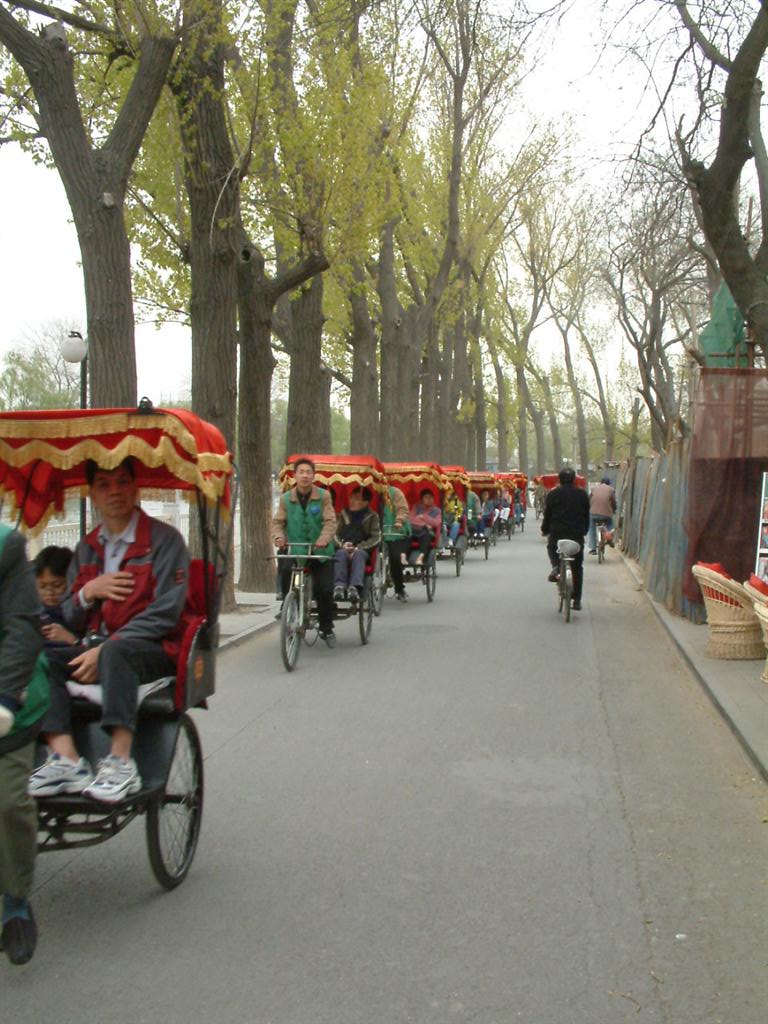
The shops in the area are in crooked little alley-like streets, and are all oriented to tourists, selling knick-knacks and somewhat higher-quality clothing (at higher-quality prices). It was fun to look, but there wasn't much that compelled buying.

We stopped for beers, which turned into a search for a restaurant. During beers, Bob's girlfriend showed up. She's a Tibetian girl, tall among the women we've seen, nominally an art student here in Beijing. She speaks Chinese and about three Tibetian dialects, but no English, so conversation was all transmitted via Bob, somewhat limiting spontaneity, but interesting nonetheless.
Dinner was at a restaurant at the lakeside. After our first day of inadvertently boycotting local cuisine, we're beginning to make up for it. I paged through the lengthy menu, which had pictures and the usual not-quite English descriptions. (In one case, apparently despairing of the dictionary, they identified some seafood by its Latin name.) I got a little worried as I spotted a fair number of offerings that made me wince, given the critters involved. Bob again took care of ordering, and slightly to my relief, everything that appeared involved recognizable ingredients. Man, it was good. An unexpected delight, I've discovered, is the greens (spinach or "some other weed, who knows" per Bob), which they do up in some way that's just yummy. But it's all great.
During dinner the weather took a turn, and in fact, right this second, the wind is blowing like crazy, which is making weird howling noises. It's not raining, but it's kicking up a lot of dust in a city that's already very dusty, a combination of endless construction, pollution, and location in an arid area. Hopefully tomorrow won't be washed out due to weather.
[categories]
personal, travel
|
link
|